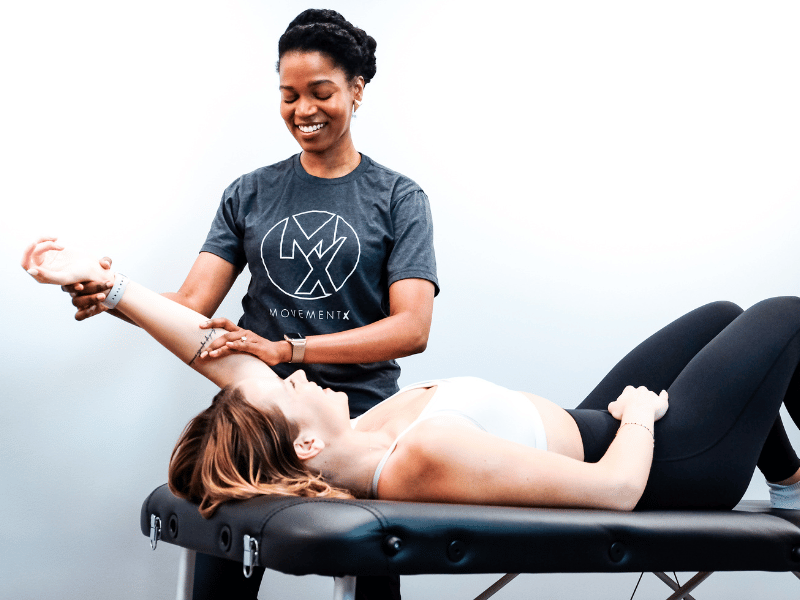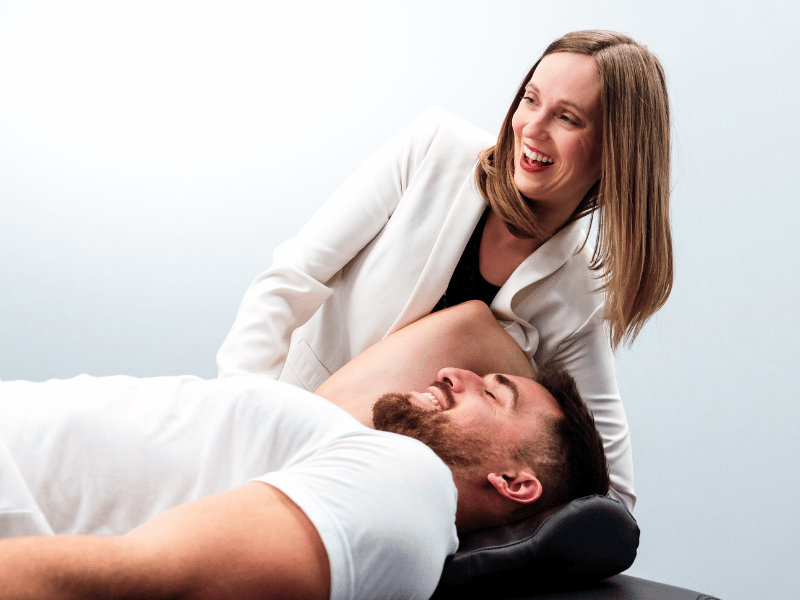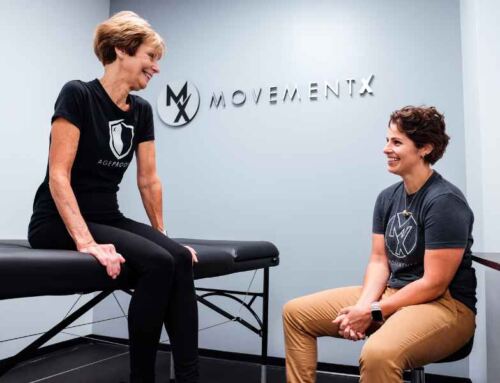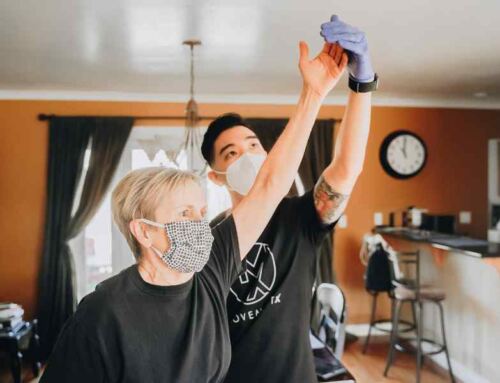Laugh Your Way to Recovery
The Surprising Benefits of Laughter in Physical Therapy
Let’s face it, physical therapy isn’t exactly a barrel of laughs. Unless, of course, you’re my patient. I’m not saying I’m a stand-up comedian or anything (although my patients might disagree), but I’ve discovered a little secret: humor is the liniment to life’s aches and pains.
I grew up in a household where laughter was as common as breathing. My dad, a master of “dad jokes” and hilarious storytelling, created an environment of constant amusement. However, it wasn’t until my first year of physical therapy school that I fully grasped the profound impact of laughter. My neurology professor, a visionary in his own right, began each lecture with a comedic video, a practice he termed “limbic stimulation,” to ease our minds before diving into complex material. This early exposure to the power of humor ignited a passion within me. So, grab a tissue for those tear-inducing laughs and let’s explore why chuckling your way to recovery might just be the best prescription.

The Science of Laughter
When you laugh, your body undergoes a series of physiological changes that benefit both your physical and mental well-being. Since 1979 when they first discovered a potential healing effect of laughter, interest in laughter as a potential therapeutic option has grown, both in popular culture as well as in scientific research (1). Here’s a breakdown of the science:
Stress Reduction
Laughter helps to decrease levels of stress hormones like cortisol. Chronic stress can hinder the healing process, so reducing it is crucial for recovery.
An original study from 1989 found cortisol decreased from 240 ± 60 at baseline to 90 ± 10 a half-hour after finishing an hour long humor video, compared to control subjects who decreased from 390 ± 90 to 270 ± 60 after the same amount of time (2).
Pain Management
Endorphins, the body’s natural pain relievers, are released during laughter. This can help alleviate discomfort and improve pain tolerance.
Immune System Boost
Laughter stimulates the immune system by increasing the production of antibodies and enhancing the overall immune response.
Research indicates that a 1-hour humor video found increases in natural killer cell activity, IgG, IgM, and other leukocytes (3).
Improved Mood
Laughter triggers the release of dopamine and serotonin, neurotransmitters associated with happiness and well-being. This can help combat depression and anxiety, common challenges for those undergoing physical therapy.
Increased Blood Flow
Laughter improves circulation, which is essential for delivering oxygen and nutrients to tissues and promoting healing.
Research has found the body responds physiologically to a bout of laughter as it does to a bout of exercise (1).
Muscle Relaxation
Laughter is a brief but intense workout for various muscle groups. Interestingly, this burst of physical activity is followed by a prolonged relaxation period that can extend up to 45 minutes (6, 7).

A Fun(ny) Finding
The Sydney Multisite Intervention of LaughterBosses and ElderClowns (SMILE) study was a research project conducted in Sydney, Australia to investigate the effects of humor therapy on nursing home residents.
The study revealed a remarkable 20% reduction in agitation among dementia patients. This improvement is comparable to the effects of commonly prescribed antipsychotic medications, but without the associated side effects. (1, 4).
Laughter and Physical Therapy: A Winning Combination
While laughter might not be the first thing that comes to mind when you think of physical therapy, it can be a powerful tool in the hands of a skilled therapist. Here are some ways laughter can be incorporated into your treatment:
Creates a positive environment
A positive and lighthearted atmosphere can make the therapy session more enjoyable. Sharing a joke, telling a funny story, or simply smiling can create a relaxed environment conducive to healing.
Enhances patient-therapist relationship
Laughter can strengthen the bond between you and your therapist, fostering trust and open communication, which is the biggest factor to successful plan of care execution and adherence.
Increases motivation
Laughter can boost your motivation to participate in therapy and stick to your treatment plan.
Improves flexibility and range of motion
Some physical therapy exercises can be incorporated into laughter-based activities, helping to improve your physical abilities. Laughter yoga has been a new intervention that is a direct way to combine humor and exercise in a therapeutic way!
At MovementX, we believe in a holistic approach to physical therapy that goes beyond traditional treatments. Our experienced therapists are trained to incorporate laughter and other fun elements into your sessions, creating a personalized and enjoyable experience.

Be Mindful (Not All Humor is the Same)
While humor can be a powerful tool in therapy, it’s crucial to use it responsibly. Cynical or derogatory humor, especially directed at patients, is never appropriate. In fact, studies suggest that healthcare providers may struggle to avoid “dark humor” as a coping mechanism, often passed down through generations (1, 5).
How to Incorporate Laughter into Your Life
While it might seem unconventional, there are plenty of ways to add laughter to your physical therapy routine as well as your daily life. Here are a few ideas:
Share jokes or funny stories: Start your session with a lighthearted conversation or share a funny anecdote. This is sometimes a good way to “break the ice” so to speak.
Watch funny videos: Incorporate short, humorous clips into your treatment plan.
Play laughter-inducing games: Games like charades or Pictionary can be adapted to fit your physical therapy goals.
Practice Gratitude: Focusing on the positive aspects of your life can help cultivate a sense of humor.
Learn to Laugh at Yourself: Embracing your imperfections can help you develop a healthier perspective.
So, there you have it! Laughter isn’t just a chuckle, it’s a full-body workout for your brain and body. It’s like hitting the gym, but without the gym clothes (or the sweat). Remember, a stiff upper lip is for broken bones, not broken spirits. So, loosen up, let your inner comedian shine, and get ready to laugh your way to recovery. After all, who wants to be a grumpy, sore patient when you can be a giggling, healing superstar?
Leave your best joke or tell us how laughter has improved your life in the comments below!
References
- Louie D, Brook K, Frates E. The Laughter Prescription: A Tool for Lifestyle Medicine. Am J Lifestyle Med. 2016 Jun 23;10(4):262-267. doi: 10.1177/1559827614550279. PMID: 30202281; PMCID: PMC6125057.
- Berk LS, Tan SA, Fry WF, et al. Neuroendocrine and stress hormone changes during mirthful laughter. Am J Med Sci. 1989;298:390-396.
- Berk LS, Felten DL, Tan SA, Bittman BB, Westengard J. Modulation of neuroimmune parameters during the eustress of humor associated mirthful laughter. Altern Ther Health Med. 2001;7:62-72.
- Low L, Brodaty H, Goodenough B, et alThe Sydney Multisite Intervention of LaughterBosses and ElderClowns (SMILE) study: cluster randomised trial of humour therapy in nursing homesBMJ Open 2013;3:e002072. doi: 10.1136/bmjopen-2012-002072
- Dharamsi S, Whiteman M, Woodllard R. The use of cynical humor by medical staff: implications for professionalism and the development of humanistic qualities in medicine. Educ Health (Abingdon). 2010;23:533.
- Paskind J. Effects of laughter on muscle tone. Arch Neurol Psychiatry. 1932;28:623–8.
- Bennett MP, Lengacher C. Humor and Laughter May Influence Health: III. Laughter and Health Outcomes. Evid Based Complement Alternat Med. 2008 Mar;5(1):37-40. doi: 10.1093/ecam/nem041. PMID: 18317546; PMCID: PMC2249748.







